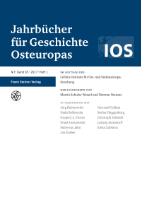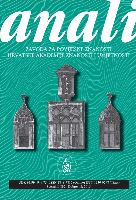
Lithuanian Historical Studies
metrics 2024
Navigating the Complexities of Lithuania’s Sociopolitical Landscape
Introduction
Lithuanian Historical Studies is a respected academic journal published by BRILL, focusing on the nuanced exploration of cultural, historical, and sociopolitical dynamics within Lithuania and its historical context. With an ISSN of 1392-2343 and an E-ISSN of 2538-6565, this journal aims to disseminate scholarly research that contributes to the understanding of Lithuania's cultural heritage and historical developments. Although it operates without an open-access model, its content is essential for researchers, professionals, and students interested in History, Cultural Studies, and Religious Studies. Ranked in the fourth quartile across several categories in 2023, including Cultural Studies and Sociology and Political Science, it provides a platform for academic discourse among those researching in the field. Despite its modest Scopus rankings, it plays a critical role in advancing knowledge within these disciplines and fostering dialogue across them, making it a valuable resource for anyone engaged in the study of Lithuanian or broader Eastern European history.
Metrics 2024
 0.10
0.10 -
- -
- 5
5Metrics History
Rank 2024
Scopus
IF (Web Of Science)
JCI (Web Of Science)
Quartile History
Similar Journals

International Journal for History, Culture and Modernity
Illuminating the Path from History to ModernityThe International Journal for History, Culture and Modernity, published by BRILL, stands as a pivotal platform for scholars and practitioners in the fields of history and cultural studies. With an ISSN of 2666-6529 and an E-ISSN of 2213-0624, this journal has been contributing to academic discourse since its inception in 2015. Focusing on contemporary historical analysis, cultural narratives, and modernity, it aims to unravel the intricacies of past and present, thereby fostering a nuanced understanding of societal evolution. Indexed in Scopus with notable rankings—Q2 in History and Q3 in Arts and Humanities (miscellaneous)—it appeals profoundly to researchers and students alike. The journal's commitment to open access ensures that its scholarly contributions remain widely available, making it an essential resource for those dedicated to advancing knowledge in the humanities. Situated in Leiden, Netherlands, at PLANTIJNSTRAAT 2, P O BOX 9000, it embodies a tradition of academic excellence that is integral for contemporary scholarship.

Rossiiskaya Istoriya
Unraveling the Complex Narratives of RussiaRossiiskaya Istoriya is a distinguished academic journal published by ROSSIISKAYA AKAD NAUK, IZDATELSTVO NAUKA, focusing on the rich tapestry of Russian history, sociology, and political science. With an ISSN of 0869-5687, this journal serves to illuminate critical historical narratives and contemporary societal issues within the Russian context. While it currently does not offer open access options, its insights are pivotal for researchers, professionals, and students keen on exploring the dynamics of Russian society and its historical developments. The journal has been recognized in the Q3 and Q4 quartiles for History and Sociology, respectively, in 2023, highlighting its contribution to academic discourse. Although the journal's coverage in Scopus has been discontinued, its ranking demonstrates a significant presence in the Arts and Humanities (Rank #1056) and Social Sciences categories (Rank #1267). The editorial team strives to present high-quality scholarly articles that not only reflect upon the past but also engage with pressing contemporary issues, making it an essential resource for anyone looking to deepen their understanding of the intricate interplay between history and social sciences in Russia.

Istorija 20 Veka
Connecting Past Events to Contemporary UnderstandingIstorija 20 Veka, published by INST CONTEMPORARY HISTORY, is a peer-reviewed journal committed to advancing the discourse on modern history and cultural studies. Since its transition to an Open Access format in 2015, this journal has provided valuable insights into the nuances of the twentieth century's historical landscape, fostering a deeper understanding among researchers and students alike. Based in Belgrade, Serbia, the journal has achieved commendable rankings in Scopus, including Q3 in both Cultural Studies and History, and it currently holds percentile ranks of 59th and 48th, respectively, in its relevant fields. The journal spans a convergence period from 2018 to 2024, encouraging the exploration of pivotal historical events and their cultural ramifications. With its robust academic platform, Istorija 20 Veka is an essential resource for professionals, scholars, and students seeking to engage with contemporary historical analysis.

European Journal of Jewish Studies
Advancing Interdisciplinary Dialogue in Jewish StudiesEuropean Journal of Jewish Studies is a distinguished academic publication that offers a comprehensive platform for scholarly inquiry into Jewish studies, addressing critical intersections with cultural studies, history, literature, and religious studies. Published by BRILL, a leading academic publisher based in the Netherlands, this journal boasts a robust reputation supported by its impressive rankings and quartile classifications—Q3 in Cultural Studies, Q3 in History, Q2 in Literature and Literary Theory, and Q3 in Religious Studies as of 2023. With its convergence years spanning from 2007 to 2024, the journal serves as a vital repository of research that navigates the complexities of Jewish identity and culture through interdisciplinary lenses. Although it does not operate under an open access model, the journal's rigorous peer-review process ensures the publication of high-quality research essential for students, professionals, and academics alike. Engaging with this journal opens up pathways for critical dialogue and innovative contributions to the field, making it an essential resource for those invested in the rich tapestry of Jewish studies.

RUSSIAN HISTORY-HISTOIRE RUSSE
Navigating the Rich Landscape of Russia’s HistoryRUSSIAN HISTORY-HISTOIRE RUSSE is a distinguished academic journal published by BRILL, focusing on the rich and complex tapestry of Russian historical studies. Established in 1975, this journal serves as a vital platform for scholars, researchers, and students interested in exploring the multifaceted aspects of Russia's past. With its ISSN 0094-288X, it has undergone significant evolution over the years, marking its converged publication years as essential milestones in the academic discourse surrounding Russian history. While currently not an open access journal, it is recognized for its rigorous peer-reviewed articles and contributes to the field's scholarship, as reflected in its 2023 Scopus ranking within the 49th percentile (Rank #876 out of 1760) in Arts and Humanities - History, and its Q4 quartile classification. Located in Leiden, Netherlands, the journal is committed to enhancing understanding of both historical patterns and contemporary implications, making it an essential resource for academic inquiry and research excellence.

JAHRBUCHER FUR GESCHICHTE OSTEUROPAS
Delving into the Intricacies of Eastern European HeritageJAHRBUCHER FUR GESCHICHTE OSTEUROPAS, published by FRANZ STEINER VERLAG GMBH, is a prominent academic journal dedicated to the exploration of Eastern European history. With its inception dating back to 1978, this journal has consistently provided a platform for scholarly discourse, contributing significantly to the understanding of the region's complex historical narratives. While the journal is not open access, it holds a solid reputation within the academic community, positioned in the Q4 quartile in history as per the 2023 category rankings, and stands at Rank #1636 within the Scopus Arts and Humanities History ranking. The convergence of its publication years throughout the decades emphasizes a long-standing commitment to historical research, thereby making it an essential resource for researchers, professionals, and students interested in Eastern European studies. Explore the intricate dynamics of historical events and cultural developments that shape Eastern Europe through this invaluable periodical.

NUOVA RIVISTA STORICA
Advancing Scholarly Discourse in HistoryNUOVA RIVISTA STORICA is a distinguished journal dedicated to the field of history, published by SOC EDITRICE DANTE ALIGHIERI SRL in Italy. With a long-standing tradition since its inception, the journal has been a pivotal platform for scholarly discourse, illuminating various historical narratives and perspectives. Though it is currently not an open-access publication, NUOVA RIVISTA STORICA provides robust access options for readers and researchers keen on exploring nuanced historical analyses. As demonstrated by its standing in the Q4 quartile of history journals and its ranking of #1425 out of 1760 within the Scopus database, it remains a valuable resource for emerging scholars and seasoned academics alike. The journal's commitment to advancing historical scholarship makes it an essential read for anyone engaged in the study of history, culture, and societal evolution.

Anali Zavoda za Povijesne Znanosti Hrvatske Akademije Znanosti I Umjetnosti u Dubrovniku
Connecting Scholars Worldwide Through Open AccessAnali Zavoda za Povijesne Znanosti Hrvatske Akademije Znanosti I Umjetnosti u Dubrovniku, an influential academic journal published by the Croatian Academy of Sciences and Arts, Institute of Historical Sciences in Dubrovnik, serves as a significant platform for research and discourse within the fields of history, archaeology, literature, and cultural studies. Since its transition to Open Access in 1999, the journal has broadened its reach, making scholarly content accessible to a global audience. As a result of its commitment to quality and rigor, it has achieved respectable rankings across various disciplines — notably, a Q3 in Literature and Literary Theory and Q4 in several other categories in the 2023 evaluations. Located in the picturesque city of Dubrovnik, this journal not only highlights the rich historical narrative of Croatia but also contributes to international dialogues on related subjects. Researchers, professionals, and students will find invaluable insights and contemporary discussions in its pages, offering a unique perspective on the intersections of history, culture, and the arts.

Chronica Nova
Charting New Territories in Cultural ScholarshipChronica Nova is an esteemed academic journal published by UNIV GRANADA, focusing on the rich field of historical and cultural studies. With an ISSN of 0210-9611 and an E-ISSN of 2445-1908, it serves as a vital resource for researchers, professionals, and students interested in exploring diverse aspects of history and its contemporary implications. While currently not available as an open-access publication, Chronica Nova facilitates a platform for the dissemination of knowledge through rigorous peer-reviewed articles, encouraging discourse among scholars and fostering educational advancements in the humanities. Hailing from the picturesque city of Granada, Spain, the journal embodies a commitment to enhancing historical scholarship and cultural understanding, making it an invaluable addition to the academic community.

Estudos Historicos
Fostering Global Dialogue in Historical and Cultural Studies.Estudos Historicos, an esteemed academic journal published by FUNDACAO GETULIO VARGAS-FGV, is a pivotal platform for scholars in the fields of History, Cultural Studies, and Literature. With a focus on contemporary historical discourse and interdisciplinary approaches, this Open Access journal has been fostering scholarly dialogue since 2009, ensuring that vital research is accessible to a global audience. Based in Brazil, it holds impressive rankings, notably within the top tier of the Scopus database, where it is positioned in the 88th percentile for Literature and Literary Theory and the 75th percentile for History. The journal also boasts a Q1 categorization in Literature and Literary Theory, reflecting its commitment to high-quality scholarship. With its comprehensive scope, Estudos Historicos plays a crucial role in shaping the understanding of historical contexts and cultural narratives, appealing to researchers, professionals, and students alike who seek to explore the intersections of history, society, and literature.